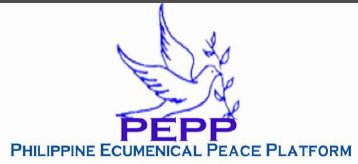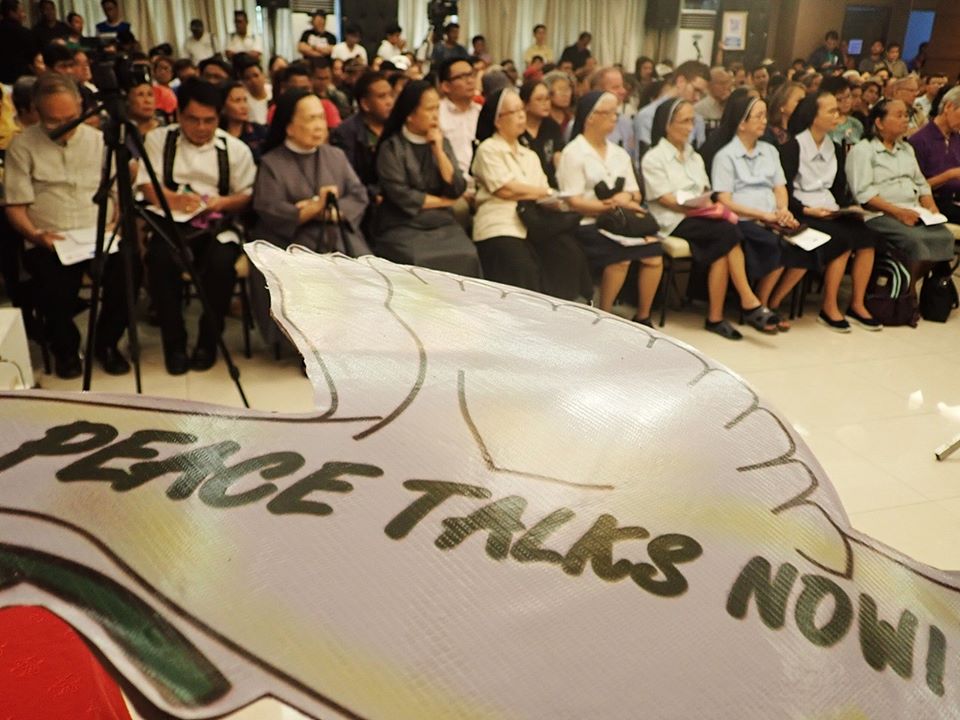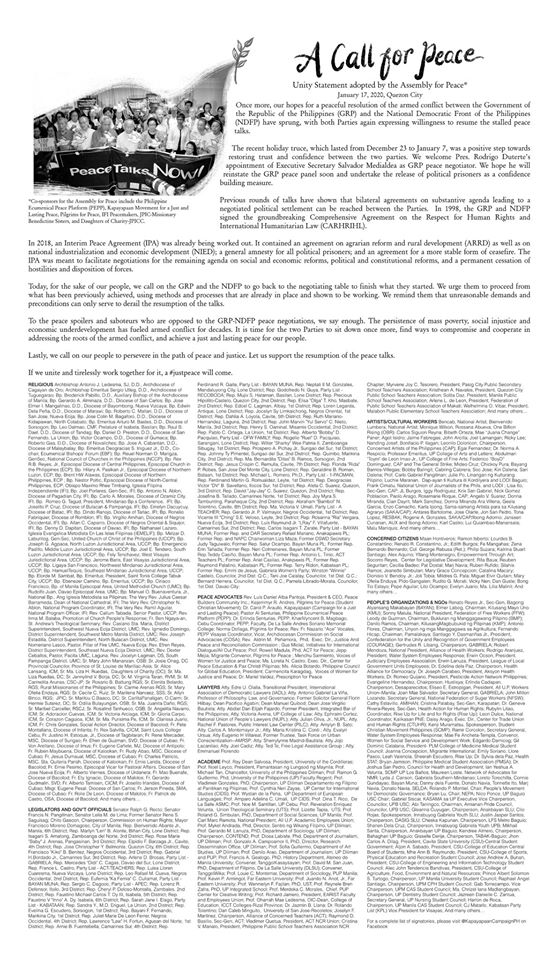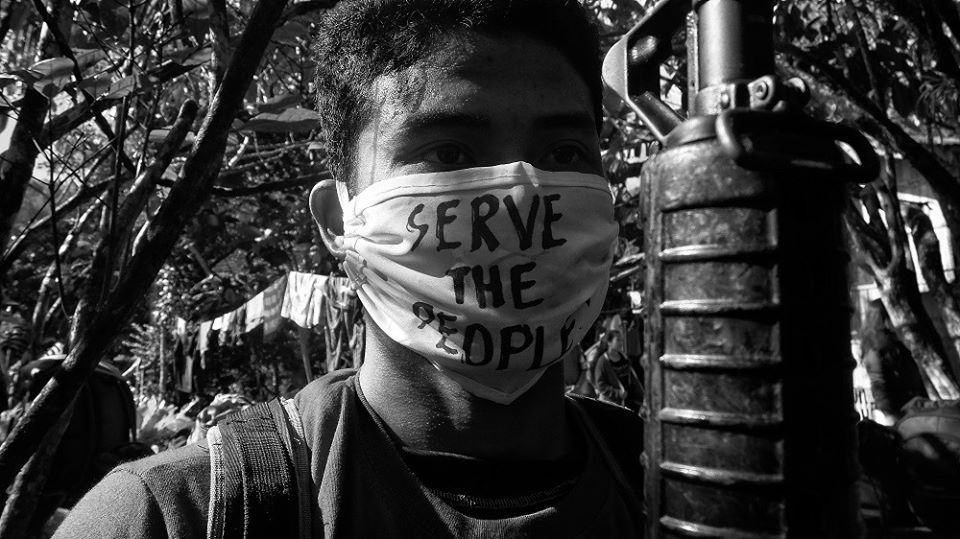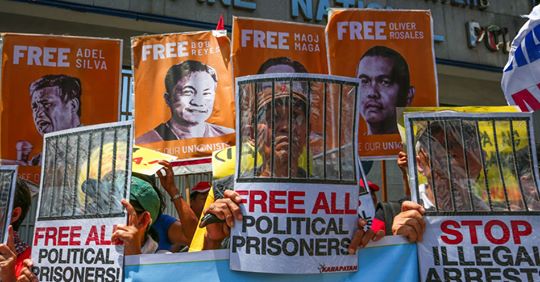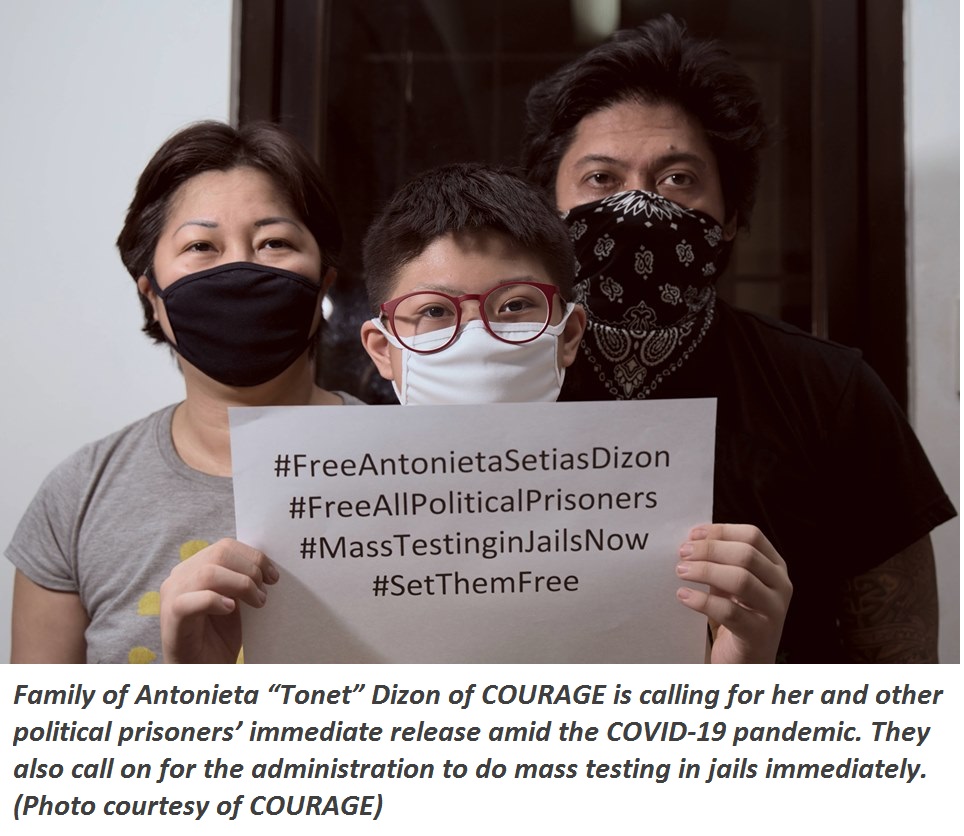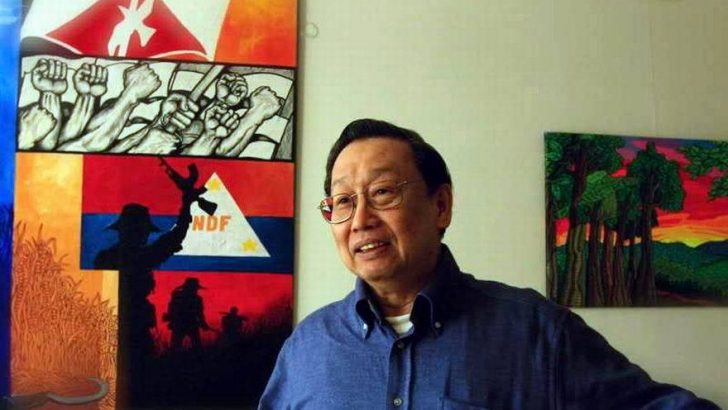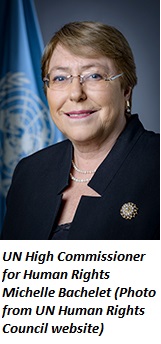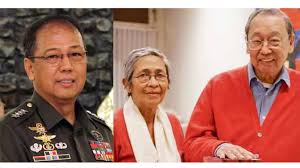
Photo from manilatoday.net
REFERENCE: Julieta de Lima
Chairperson NDFP RWC-SER
January 14, 2020
Statement by the Reciprocal Working Committee on Socio- Economic Reforms, National Democratic Front of the Philippines
National Security Adviser Hermogenes C. Esperon, Jr. and Presidential Peace Adviser Carlito G. Galvez Jr. recently weighed in on the possible resumption of peace talks between the Philippine government (GRP) and the National Democratic Front of the Philippines (NDFP). In separate statements, they particularly focused on the Comprehensive Agreement on Social and Economic Reforms (CASER) being negotiated when the talks were interrupted.
Their commentaries are at the very least grossly misinformed. Worse, however, the two former chiefs-of-staff of the Armed Forces of the Philippines (AFP) maliciously distort the considerable progress the GRP and NDFP made on the CASER between August 2016 and November 2017.
Technical negotiations were completed on two of the most important sections of CASER with substantially completed drafts on Agrarian Reform and Rural Development (ARRD) and National Industrialization and Economic Development (NIED). These two sections alone will give vast benefits for tens of millions of Filipinos and the cause of national development.
The crude anti-Left ideological biases and sheer malice of the two former military officials expose their total ignorance about the technical negotiations already undertaken by the respective RWCs of the GRP and the NDFP. They are showing themselves as chronic saboteurs of the peace process and are proving to be among the biggest obstacles to peace in the country.
Real social and economic reforms
The CASER is critically important to the NDFP and the Filipino people. It addresses the social and economic roots of armed conflict and, for this, is considered the meat of the peace talks.
The NDFP and GRP each brought their own draft versions of the CASER to the negotiating table. Both are presumed to be negotiating in good faith with their respective proposals for addressing long-standing Philippine poverty, inequality and underdevelopment. The point of the CASER is to reconcile these distinct versions to produce a mutually agreed program of social and economic reforms.
The NDFP draft version of the CASER contains over 500 provisions consistently upholding the interest and welfare of the majority of Filipinos. It fearlessly confronts the self-serving economic interests that keep Filipinos poor and the economy backward. The original NDFP draft CASER was prepared in 1998. This was widely disseminated and discussed in guerilla zones and public forums with subsequent updates in 2004, 2011 and 2016-17.
The peace talks give the opportunity for the public to better understand CASER. It is understandable that former generals Esperon and Galvez are afraid of wider public knowledge about the NDFP’s proposals. The NDFP’s draft CASER clearly and emphatically shows what the revolutionary forces are fighting for – an economy that genuinely serves the people instead of just foreign and domestic elites.
But the peace talks in 2016 and 2017 have progressed beyond the Parties just having their respective drafts of the CASER. The CASER will be an expansive deal with 11 substantive sections of policy reforms. The four formal rounds of talks abroad and seven meetings in the Philippines produced a common outline for the CASER and common drafts on the sections on ARRD and NIED.
These mutually agreed common drafts were prepared by the bilateral teams for CASER of the NDFP and GRP, received by their respective Reciprocal Working Committees for Social and Economic Reforms (RWCs-SER) in November 2017, and are up for approval by the NDFP and GRP panels upon a resumption of talks.
Contrary to Galvez’s claim that “CASER is a product of a secret backchannel maneuver,” the substantive content of these common drafts were widely taken up by the NDFP not just in guerilla zones but in sectoral consultations nationwide. The content of the NDFP’s CASER is possibly even more widely known than the GRP’s own Philippine Development Plan 2017-2022.
The GRP panel can also confirm its numerous multi-agency meetings on the CASER and the wide participation of various line agencies, Congress, local government officials, Congress and the academe in the formal rounds abroad as well in the bilateral team meetings in the Philippines.
In particular, the common drafts were produced with officials from the National Economic and Development Authority (NEDA), Department of Agrarian Reform (DAR), Department of Agriculture (DA), Department of Environment and Natural Resources (DENR), National Commission on Indigenous Peoples (NCIP), Land Bank of the Philippines (LBP), Department of Finance (DOF), Department of Trade and Industry (DTI), Department of Science and Technology (DOST), and others. The GRP also brought in academics from the University of the Philippines (UP), De La Salle University (DLSU), and Ateneo as well as representatives of civil society.
Esperon and Galvez intentionally muddle the NDFP’s unilateral draft version of the CASER with the negotiated and mutually agreed CASER that the peace talks will produce. They maliciously diminish and vilify the progress that the peace talks have made to sabotage this and give way to their narrow-minded hawkish militarism.
Economic progress
Their criticisms of the NDFP draft CASER are moot because there are already mutually agreed common drafts of the ARRD and NIED sections of CASER. The NDFP and GRP shared ideas and sought creative solutions to the country’s social and economic problems.
The common drafts show that it is possible for the Parties to set aside ideological differences and unite on concrete steps for the common cause of real economic progress for the nation.
The most publicized highlight of the ARRD common draft is the proposed immediate free distribution of land including writing-off remaining balances on land already distributed. Agrarian reform is defined to cover plantations and large-scale commercial farms with leasehold, joint venture, and non-land transfer schemes such as the infamous stock distribution option. There are also reforms in fisheries and aquatic resources.
Farmers and fisherfolk will be provided a wide range of support services and benefit from the elimination of exploitative lending and trading practices. ARRD however also includes clear commitments to build rural infrastructure, develop rural industries, and improve domestic science and technology.
The NIED common draft critically affirms the importance of national industrialization for long-term development. It recognizes the need for sound planning and regulation of foreign investment to develop specific industries. The benefits of nationalized public utilities and mining, of Filipino processing of minerals and trading, and of breaking foreign monopoly control of industrial technologies are also well-understood.
Filipino industrial science and technology will be developed. The important role of workers is acknowledged and they will be given a greater role in the running of enterprises. Financing for industrialization will be raised from progressive taxes, luxury and sin taxes, official aid, foreign investment and other sources.
There are still a few details remaining in the ARRD and NIED common drafts for further discussion but these are expected to be easily resolved by the RWCs-SER and panels. Particular attention will be given to making sure that the implementing provisions enable real policy action and development outcomes.
Reaching agreement on the remaining sections of the CASER promises even more benefits for the Filipino people. The NDFP’s extensive proposals span protecting the environment to developing Filipino culture, decent employment to social protection, providing free education and health to affordable housing and utilities, upholding indigenous peoples’ (IP’s) rights to asserting economic sovereignty, and much more.
Disparaging CASER
The criticisms of Esperon and Galvez are at the very least ill-informed. Their poor grasp of economics, global policy trends, and the country’s economic realities makes them believe that so-called neoliberal globalization policies are desirable.
They still mistakenly think that economies have overcome underdevelopment because of free market policies. This is belied by the historical experience of the old industrial capitalist powers, the newly-industrialized countries, and especially the former Socialist economies. But they are also oblivious of the globalization-induced stagnation in the world economy, growing protectionism and trade wars today.
They also still mistakenly think that the Philippines is developing. Yet domestic agriculture and Filipino industry have been in steady neoliberal policy-induced decline for some four decades now. As it is, the economy is just kept afloat by a bloated unproductive service sector, overseas remittances, and debt. The country is more and more reduced to begging for scraps from foreign investment.
Unprecedented levels of joblessness, landlessness, homelessness, low productivity and poverty are disguised by misleading official statistics. Oligarch wealth and a narrow upper middle class divert from how the overwhelming majority of Filipinos struggle with low incomes, irregular work, and decrepit social services. The CASER that the NDFP and GRP are negotiating seek to resolve all these and more.
Other criticisms are perplexing. They criticize the CASER as treasonous, surrendering the national government’s integrity and the State’s sovereignty, and yielding “the country’s laws, norms and other institutional democratic foundations”. It is gross perversity for them to slander national industrialization and genuine land reform in such terms. They glorify the traditional servility to foreign investors and banks as the only path to development.
They also say that “most of” the NDFP’s demands are “almost impossible to implement”. Yet the CASER is precisely an agreement reached by the two Parties containing what each side is agreeable to. Esperon and Galvez bewail a ‘CASER’ that exists only in their paranoid militarist minds.
They criticize the CASER for binding the NDFP and GRP including their successors. It is bizarre that they expect an agreement to be meaningful only if its validity or effectivity holds for the current leadership in peace talks and not for the institutions and organizations they respectively represent.
They claim that CASER takes away the direct participation of IPs in issues such as agrarian reform. There is no such provision in any of the common CASER drafts reached by the NDFP and GRP that are up for approval by their negotiating panels. Indeed, the NDFP’s proposed CASER is much more assertive about IP rights. It explicitly recognizes the range of IP rights, ensures this across every section, and even affirms the national minorities’ right to self-determination. If anything, the NDFP calls for a new law more strongly upholding all these rights.
They claim that CASER confiscates and expropriates assets of foreign monopoly capitalists, big compradors and bureaucrat capitalists. The NDFP is indeed determined to dismantle the structures of economic power that keep the economy backward and the people exploited and poor. But there is no such provision in any of the common CASER drafts reached by the NDFP and GRP that are up for approval by their negotiating panels.
They claim that CASER demobilizes the AFP and says that the Philippine military shall stand down. There is no such provision in any of the common CASER drafts reached by the NDFP and GRP that are up for approval by their negotiating panels.
Agreeing for development
The initial rounds of peace talks under Pres. Rodrigo Duterte accomplished much in a short period of time. The CASER became an agenda of the peace talks in 1998 and, over 18 years, only its preamble and declaration of principles were discussed. Talks on specific substantive proposals only started in August 2016 and, after just one year and three months, basic agreements were reached on ARRD and NIED.
The CASER is an agreement between the NDFP and the GRP so its final contours and content will depend on the outcome of negotiations. What is certain however is that the eventual CASER will prioritize the Filipino people, national development, social justice and just peace. Far beyond merely contributing to ending armed conflict, it will deliver immediate and concrete benefits and lay the basis for the country’s long-term development under conditions of national independence, democracy and just peace..
The misguided, ill-informed and malicious commentaries on the CASER of Esperon and Galvez are most of all intended to sabotage the possible resumption of the peace talks between the NDFP and the GRP. Their narrow-mindedness also blocks the most important mechanism in the country for challenging the inequitable status quo and greatly accelerating development for the overwhelming majority of the people. ###
